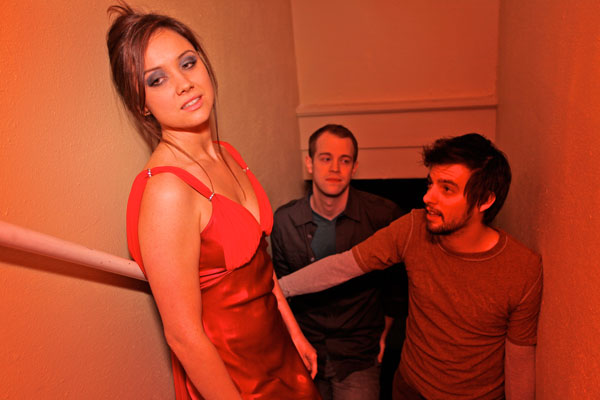
LOVE ACTUALLY | A prostitute (Natalie Young) toys with two men (Alex Organ, Drew Wall).
Love triangles and dark turns in ‘Red Light Winter’
ARNOLD WAYNE JONES | Life+Style Editor
jones@dallasvoice.com
I wouldn’t call Red Light Winter the most enjoyable 2-1/2 hours I’ve spent at the theater recently, but it certainly ranks among the most memorable. I mean both in the best sense: This is serious theater full of ideas and deep emotion and handled with a power and sensitivity that can be arresting. It’s also a brutal mindfuck that feels borne of genuine ache.
Matt (Drew Wall) is a tortured playwright vacationing with his best friend Davis (Alex Organ) in Amsterdam. During the wordless opening sequence, we see Matt seized with such pain he makes a lame, failed attempt at suicide. Then Davis arrives with Christina (Natalie Young), a prostitute from the city’s famed red light district, who agrees to sleep with Matt to get him out of his doldrums.
 What is intended by all parties as a meaningless shag, though, escalates into a complex love triangle, as Matt becomes smitten with Christina (by Act 2, it has reached the point of obsession) and Christina finds she holds undeniable feelings for Davis, who is himself married to Matt’s ex-fiancee. All that’s missing is Jerry Springer.
What is intended by all parties as a meaningless shag, though, escalates into a complex love triangle, as Matt becomes smitten with Christina (by Act 2, it has reached the point of obsession) and Christina finds she holds undeniable feelings for Davis, who is himself married to Matt’s ex-fiancee. All that’s missing is Jerry Springer.
On paper, Red Light Winter might sound like a Hollywood romantic comedy, but despite a strong thread of humor, it’s a dark, fatalistic view of love.
The greatest weakness of the play is one of its essential conceits: The relationship between Matt and Davis. Davis is such a amazing prick, so effortlessly evil and self-involved, you cannot imagine the circumstances that would have led him to befriend Matt in the first place. We all have youthful friends we have outgrown, and have seen those types who bully their ways into the lives of weaker men, but those relationships, however dysfunctional, need to feel rooted in a shared past, a symbiosis where each feeds an emptiness in the other. It’s basically the only relationship Neil LaBute can write.
But there’s no hint of that here; when Matt describes Davis as “like a brother to me,” it rings hollow — family you’re born with, but why hang out with abusive assholes? Why does he keep Davis close him? And if they truly are so close, why is Davis surprised by Matt’s fixation on Christina?
The play’s own self-referentiality doesn’t help. This is a play about a guy writing a play about the events of the play. It’s difficult not to read a degree of autobiography into Adam Rapp’s script, which basically presents us as an audience with the dilemma of the unreliable narrator: Could the real Davis be this bad? Or the real Christina this self-destructive? Or the real Matt this fragile and victimized?
As fundamental as these shortcomings are, ultimately they do not detract significantly from the skillful handling of the rest of the material. Organ is infuriatingly effective, using his insincere, Palin-esque demagoguery to emotionally rape those around him. He uses coarseness and promiscuity as badges of honor, degrading people with his insulting, reductionist language. It’s a testament to Organ’s performance that more than once, you wanna step out of your seat, walk on stage and kick him in the nuts.
But the heavy lifting of the play is borne on the backs of Wall and Young. Wall’s always felt like a tightly-wound spring on stage, his nervous energy burning off all fat until he’s left with a lean, translucent frame from which his id is ready to burst. This is his most sophisticated role, and he’s excellent. Young, who resembles Maggie Gyllenhaal, has an amazing stage presence, her sadness drawing you in. Together they share a stark, naked (literally) intimacy that includes the most frank, explicit onstage sex since Avenue Q.
Regan Adair’s direction is unrushed and visceral, letting the action build and play out silently but with a stinging sense of desperation. Red Light Winter isn’t easy to watch, but you can’t look away.
This article appeared in the Dallas Voice print edition April 29, 2011.















